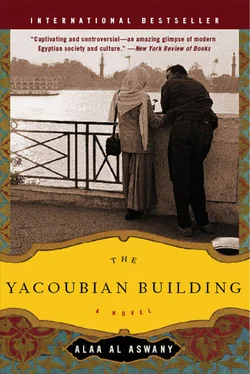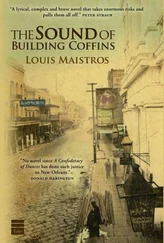Alaa Al Aswany - The Yacoubian Building
Здесь есть возможность читать онлайн «Alaa Al Aswany - The Yacoubian Building» весь текст электронной книги совершенно бесплатно (целиком полную версию без сокращений). В некоторых случаях можно слушать аудио, скачать через торрент в формате fb2 и присутствует краткое содержание. Год выпуска: 2006, ISBN: 2006, Издательство: Adobe Acrobat eBook Reader, Жанр: Современная проза, на английском языке. Описание произведения, (предисловие) а так же отзывы посетителей доступны на портале библиотеки ЛибКат.
- Название:The Yacoubian Building
- Автор:
- Издательство:Adobe Acrobat eBook Reader
- Жанр:
- Год:2006
- ISBN:978-0-06-087813-9
- Рейтинг книги:5 / 5. Голосов: 1
-
Избранное:Добавить в избранное
- Отзывы:
-
Ваша оценка:
- 100
- 1
- 2
- 3
- 4
- 5
The Yacoubian Building: краткое содержание, описание и аннотация
Предлагаем к чтению аннотацию, описание, краткое содержание или предисловие (зависит от того, что написал сам автор книги «The Yacoubian Building»). Если вы не нашли необходимую информацию о книге — напишите в комментариях, мы постараемся отыскать её.
The Yacoubian Building — читать онлайн бесплатно полную книгу (весь текст) целиком
Ниже представлен текст книги, разбитый по страницам. Система сохранения места последней прочитанной страницы, позволяет с удобством читать онлайн бесплатно книгу «The Yacoubian Building», без необходимости каждый раз заново искать на чём Вы остановились. Поставьте закладку, и сможете в любой момент перейти на страницу, на которой закончили чтение.
Интервал:
Закладка:
The Englishman’s sternness here does not stem from any concern for morality of course but from calculations of profit and loss, since plainclothes officers often visit the bar. True, they satisfy themselves with a quick glance from a distance and don’t disturb the patrons at all (thanks to the large bribes they receive), but if they were to witness any scandalous act there, they would make a huge fuss, since that would be their opportunity to blackmail the Englishman into paying even more.

A little before midnight, the door of the bar opened and Hatim Rasheed appeared with a dark-complexioned young man in his twenties wearing inexpensive clothes, his hair cropped like a soldier’s. The people in the bar were drunk, shouting and singing loudly. All the same, as soon as Hatim entered, their racket diminished and they took to observing him with curiosity and a certain awe. They knew that he was a kudyana, but a forbidding natural reserve prevented them from acting familiarly with him and even the most impudent and obscene of the customers could do no other than treat him with respect.
There were a number of reasons for this. Hatim Rasheed is a well-known journalist and editor-in-chief of the newspaper Le Caire , which comes out in Cairo in French. He is an aristocrat of ancient lineage whose mother was French and whose father was Dr. Hassan Rasheed, the famous jurist and dean of the College of Law in the 1950s. In addition, Hatim Rasheed is a conservative homosexual, if that is the right expression: he does not sacrifice his dignity, put powder on his face, or stoop to using provocative ways as do many kudyanas. In appearance and behavior he always chooses a skillful compromise between elegance and femininity. Tonight, for instance, he is wearing a dark wine-red suit and has knotted around his slender neck a yellow scarf, most of which he has tucked under his pink, natural-silk shirt, the two ends of the latter’s broad collar flopping over the front of his jacket. With his smart clothes, svelte figure, and fine French features, he would look like a scintillating movie star were it not for the wrinkles that his riotous life has left on his face and that sad, mysterious, gloomy look that often haunts the faces of homosexuals.
Aziz the Englishman went toward him to welcome him and Hatim shook his hand affectionately, gesturing gracefully toward his young friend and saying, “My friend Abd Rabbuh, who’s doing his military service in Central Security.”
“Pleased to meet you,” said Aziz, smiling and looking the strong, muscular young man over. Then he led his two guests to a quiet table at the end of the bar and took their orders — gin and tonic for Hatim, an imported beer for Abd Rabbuh, and some hot hors d’œuvres . Gradually, the customers lost interest in them and resumed their talk and raucous laughter.
The two friends appeared to be engrossed in a long and wearisome argument, Hatim speaking in a low voice and looking at his friend as though trying to convince him of something, Abd Rabbuh listening unmoved and then replying vehemently. Hatim would remain silent for a moment, his head bowed, then resume the attempt. The conversation went on this way for almost half an hour, during which the two companions drank two bottles of beer and three glasses of gin, and at the end of which Hatim leaned his back once more against the back of the seat and directed a penetrating glance at Abduh.
“That’s your last word?”
Abduh replied in a loud voice, the alcohol having gone quickly to his head, “Yes!”
“Abduh, come with me tonight and we’ll work things out in the morning.”
“No.”
“Please, Abduh.”
“No.”
“Very well. Can we work things out quietly? None of that quick temper of yours!” whispered Hatim winningly, touching with his fingers his friend’s huge hand as it lay on the table. This insistence seemed to exasperate Abduh who let out his breath in annoyance and said, “I told you I can’t stay with you tonight. I was late three times last week because of you. The officer will refer me for disciplining.”
“Don’t worry! I’ve found someone who can put in a good word for you with the officer.”
“Ouff!” screamed Abduh with annoyance, pushing the beer glass with his hand so that it fell over with a ringing crash. Then he got up, directed an angry look at Hatim, and rushed to the exit. Hatim pulled some notes out of his wallet, threw them on the table, and hurried after his friend. For a few moments, silence reigned in the bar. Then the drunken comments rang out:
“A barghal with attitude, me boys!”
“Pity the one who loves and can’t get no satisfaction!”
“What to do, Honey, now you done used up all my money?”
The men laughed uproariously and burst enthusiastically and with resonant voices into a round of indecent songs, so that Aziz the Englishman was obliged to intervene to restore order.

Like most Egyptians from the countryside, Muhammad el Sayed, cook’s assistant at the Automobile Club, had suffered from bilharzia, which he contracted early on in life and which had led to inflammation and failure of the liver by the time he reached fifty. Busayna, his eldest daughter, remembers well the day in Ramadan when, after the family had eaten its breakfast meal in their small apartment with its two rooms and a latrine on the roof of the Yacoubian Building and her father had gone to perform the evening prayer, they suddenly heard the sound of some thing heavy falling to the ground. Busayna remembers too her mother’s agonized scream, “Go help your father!” They all ran to him — Busayna, Sawsan, Fatin, and little Mustafa. Their father was lying on the bed in his white gallabiya, his body completely still and his face a dull blue. Once they had called the ambulance and the raw young doctor had made a quick examination and announced the sad news, the girls let out piercing screams and their mother started slapping hard at her face, keeping it up till she fell to the floor.
At the time Busayna was studying for a commercial diploma and had dreams for the future that it would never have occurred to her might not come true: she was going to graduate and marry her sweetheart Taha el Shazli after he graduated from the Police Academy, and they would live in a nice spacious apartment a long way from the Yacoubian roof, and they would have just one boy and one girl so that they could raise them properly. They had everything worked out, but her father had died suddenly and with the passing of the mourning period the family found itself destitute. The pension was meager and did not cover the costs of schooling, food, clothes, and rent. Her mother soon changed. She always wore black, her body withered and dried out, and her face took on that stern, masculine, prickly look that poor widows have. Little by little she grew bad-tempered and took to quarreling all the time with the girls; even little Mustafa wasn’t spared her beatings and abuse. After each scene she would abandon herself to a long bout of crying. She stopped talking about the departed with the great affection she had shown in the early days and instead starting talking about him in a bitter and disappointed way, as though he had let her down and deliberately left her in this mess. She started disappearing two or three days a week, leaving in the morning and returning at the end of the day exhausted, silent, and distracted, carrying bags of cooked food all mixed up together (rice and vegetables and little bits of meat or chicken) which she would heat and give them to eat.
The day Busayna passed her exams and got her diploma her mother waited until night had fallen and the rest of the family was asleep and took her out onto the roof. It was a hot summer night and men were smoking goza and chatting the evening away while a few women were sitting in the open air to escape the heat of their cramped iron rooms. The mother greeted them and pulled Busayna by her hand to a distant part of the roof, where they stood next to the wall. Busayna can still recall the sight of the cars and the lights of Suleiman Basha as they appeared that night from the roof, along with her mother’s frowning face, her stern, penetrating looks, and her harsh, strange voice as she spoke to her of the burden the departed had left her with to endure on her own, and informed her that she was working in the house of some good-hearted people in Zamalek but had kept it a secret so that it wouldn’t affect Busayna’s or her sisters’ marriage prospects (when people found out that their mother was working as a maid). The mother asked Busayna to look for a job for herself, starting the next day. Busayna did not reply but looked at her mother for a little, overwhelmed by tenderness. Then she bent down toward her and hugged her. It occurred to her as she kissed her that her face had gotten dry and coarse and that a new, strange smell came off her body — the smell of sweat mixed with dust that maids give off.
Читать дальшеИнтервал:
Закладка:
Похожие книги на «The Yacoubian Building»
Представляем Вашему вниманию похожие книги на «The Yacoubian Building» списком для выбора. Мы отобрали схожую по названию и смыслу литературу в надежде предоставить читателям больше вариантов отыскать новые, интересные, ещё непрочитанные произведения.
Обсуждение, отзывы о книге «The Yacoubian Building» и просто собственные мнения читателей. Оставьте ваши комментарии, напишите, что Вы думаете о произведении, его смысле или главных героях. Укажите что конкретно понравилось, а что нет, и почему Вы так считаете.












